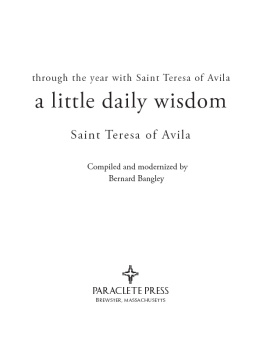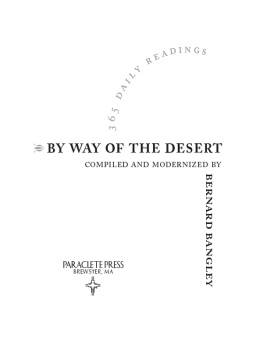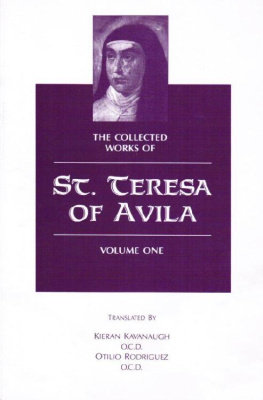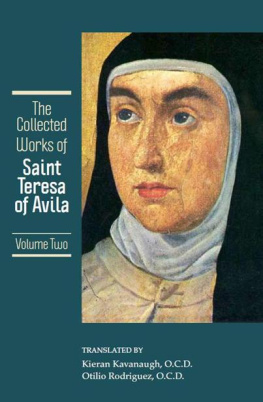through the year with Saint Teresa of Avila
a little daily wisdom
through the year with Saint Teresa of Avila
a little daily wisdom
Saint Teresa of Avila
Compiled and modernized by
Bernard Bangley

PARACLETE PRESS
BREWSTER, MASSACHUSETTS
A Little Daily Wisdom: Through the Year with St. Teresa of Avila
2011 First Printing
Copyright 2011 by Bernard Bangley
ISBN 978-1-55725-697-3
All Scripture quotations, unless otherwise noted, are taken from The New Revised Standard Version, copyright 1989 by the Division of Christian Education of the National Council of the Churches of Christ in the United States of America. Used by permission. All rights reserved.
Scripture quotations designated TEV are from the Todays English Version, 1966, 1971, 1976 by American Bible Society, and are used by permission.
Scripture quotations designated KJV are from the Authorized King James Version of the Holy Bible.
Library of Congress Cataloging-in-Publication Data
Teresa, of Avila, Saint, 1515-1582.
[Selections. English. 2011]
A little daily wisdom: through the year with Saint Teresa of Avila / compiled and modernized by Bernard Bangley.
p. cm.
ISBN 978-1-55725-697-3
1. Devotional calendars--Catholic Church. 2. Catholic Church--Prayers and devotions. I. Bangley, Bernard, 1935- II. Title.
BX2179.T3E5 2011
242.2--dc22
2010040660
10 9 8 7 6 5 4 3 2 1
All rights reserved. No portion of this book may be reproduced, stored in an electronic retrieval system, or transmitted in any form or by any meanselectronic, mechanical, photocopy, recording, or any otherexcept for brief quotations in printed reviews, without the prior permission of the publisher.
Published by Paraclete Press
Brewster, Massachusetts
www.paracletepress.com
Printed in the United States of America
introduction
S t. Teresa of Avilas life and writing destroy every notion that there are two kinds of religious personalities: active and contemplative. The story of Mary and Martha recorded in Luke 10:3842, so beloved by generations of Christians, tends to make us think that the two patterns of behavior are clear opposites and mutually exclusive. The Christian is either a Martha, busy with the dishes, or a Mary, conversing with Jesus. Such a simple distinction is simply not truenot even for Mary and Martha. Most of us combine the characteristics of both, emphasizing one or the other as circumstances dictate or allow. Teresa is an outstanding example of a thorough blending of both.
Baptized in 1515 in Avila, Spain, as Teresa Snchez de Cepeda y Ahumada, she was one of ten children in an affluent family. People considered Teresa a beautiful girl with a pleasant disposition. Her mother, Beatriz, died when Teresa was a teenager. Her father turned her care over to Augustinian nuns in 1531. At the age of twenty-one, without her fathers approval, she fulfilled a personal dream and became a Carmelite nun in her hometown.
As a nun Teresa influenced the history and practices of the Roman Catholic Church in significant ways. She led her Carmelite order toward a stricter observance and ultimately founded fourteen monasteries. Her spirit of reform reached out through the cooperation of her friend Juan de la Cruz, known to us as St. John of the Cross, to change the manner of living for male Carmelites. The reformers used the terms calced and discalced (with shoes or without, i.e., barefoot) to denote the difference of humility they had brought about in their religious communities, which followed Teresas practice of poverty and renunciation.
Plagued with very poor health, Teresa somehow managed to attend to a multitude of administrative details. She directed the work of laborers the way a modern contractor hires and oversees employees. She dealt with royalty and with city hall diplomatically. She put in an exhausting day that began with worship at five in the morning and often kept her at her desk until well past midnight.
It is this same busy, creative, determined administrator who is also one of the greatest contemplative spirits in history. While signing contracts or confuting her critics, she was aware that she was living her life in the presence of God. Teresa would not have us understand that in a figurative sense. She had a personal experience of mystical union with God through a remarkable prayer life that dominated her existence. She died in 1582 at the age of sixty-seven. Pope Gregory XV canonized her in 1622, and in 1970 she became, with St. Catherine of Siena, the first female Doctor of the Church.
Teresa wrote enduring books on prayer and Christian living. Her work will always be in print in many languages, and new versions continue to appear. The present book is unique because it is the first attempt to give an interested reader a broad exposure to the vast expanse of Teresian literature. If all you read of Teresa are the several famous passages relating her mystical experiences, you will gain a distorted notion of her. By spending a few moments each day for a full year with this volume, you will gain a solid familiarity with every aspect of Teresas life and thought. I have gently paraphrased selections from the entire collection of her work into contemporary English.
Sometimes Teresas writing becomes difficult as she attempts to express the inexpressible. She knows what she wants to say, but she has trouble determining how to say it. She fills many pages with brief prayers and expressions of exasperation. Teresa says there are no words available to describe her rapturous experiences. She is correct, but she attempts it anyway. Paraphrasing these breathless passages into contemporary English presents a considerable challenge, with a risk of distorting her ideas. Using extreme care, in a few places I have compressed an entire page into a single sentence. But ultimately I hope that this volume will be a springboard for you to discover the pleasure of reading one of the complete editions of Teresas works.
Some of Teresas terminology may seem strange to todays reader. I have often translated her use of a word into more familiar terms, but for accuracy a few examples of her specific terms remain. Five such words require explanation:
HIS MAJESTY: This is one of Teresas favorite nicknames for God. It reflects her reverent perception of the royalty and power of the divine. As closely as she lived with God, her manner of expression never became too familiar. She always exhibits the utmost courtesy and respect. She knows God rules and trusts him to get things done.
PERFECTION: Jesus said, Be perfect, therefore, as your heavenly Father is perfect (Matt. 5:48). Scholars tell us the Greek word for perfection used here is in the future tense, implying the moral obligation of a correct attitude rather than perfect conduct of life. Perfection is integrity in our relationship with God. Moral perfection is not something we can attain here on earth. Teresa is not talking about legalism or an abstract ideal. Perfection, for her, is wholeheartedly serving God. The more we love God and neighbor, the more perfect we become.
RECOLLECTION: In our time, this word refers to memory. When someone says, I recollect, it is a matter of recalling something almost forgotten. In classic Christian spirituality, recollection refers to a tranquil mind undisturbed by wandering thoughts. A prayer of recollection turns our vision inward, away from externalities. Teresa thinks of recollection as the entrance to the interior life and an indicator that ones soul is prepared to receive.
VISITATOR: This term refers to a representative of the pope who formally visited and inquired about conditions in a religious community. Personal interviews with superiors and members uncovered both joys and concerns, opening a way for support and correction.
Next page













